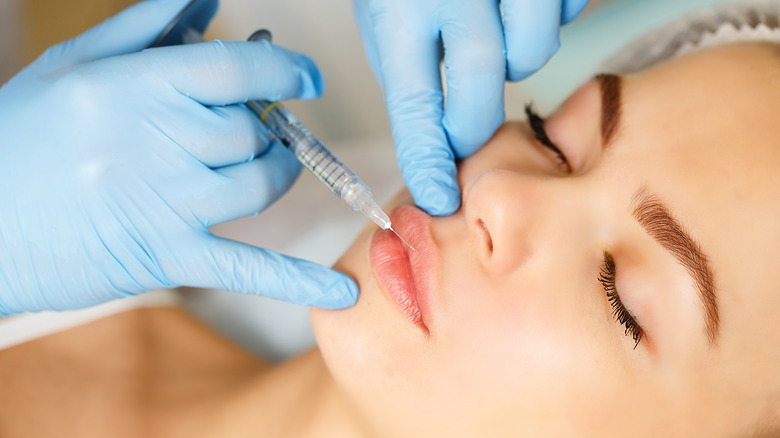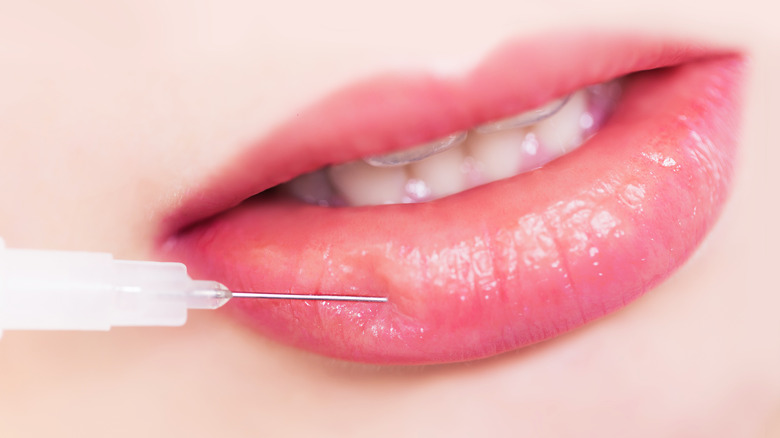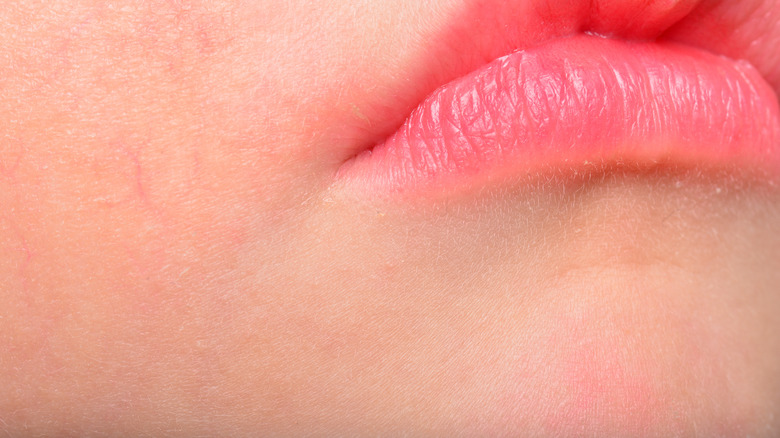The Untold Truth Of Lip Injections
Blame it on the Kardashians or the constant Instagram selfies, but lip injections are all the rage and don't appear to be going anywhere soon. This outpatient procedure performed by a plastic surgeon is becoming more common, but that doesn't mean it's risk-free. From temporary bruising to permanent tissue death, there is a lot more to lip injections than meet the eye. Before you consider going for a pouty pucker, make sure you have all the facts.
They could cause tissue damage
Any time you inject a foreign substance into your body, there is a risk. For your lips, an injection could even cause tissue damage and death.
"The biggest risk for any type of the filler injections is necrosis, which means filler got injected into a blood vessel and caused tissue death," Founder & Medical Director of Parfaire Medical Aesthetics Dr. Winnie Moses told The List. "It is a very rare complication, but can happen. Therefore it's very important to find a well-qualified and well-trained professional to do the treatment."
If you're ready to try your first lip injection, make sure to find an experienced physician and ask about all of the possible side effects.
Many of the side effects are temporary
Fortunately most of the possible side effects of lip injections are mild and temporary. "The other common risks involve bruising, swelling, and lumpiness, but those are temporary and typically only last for a few days," explained Dr. Moses. After the procedure, remember that you won't have a clear picture of your results until a few days later.
They last six to nine months
This may sound naive, but I just assumed that lip injections were a permanent procedure. However, in reality the lifespan of lip fillers isn't as long as you might think.
"Most lip fillers last about six to nine months due to the frequent lip movement," said Dr. Moses. "There are newer fillers that can last up to a year." Ask your doctor about your options and how long each one lasts. Because we are using our lips all day long to talk, eat, and drink, most fillers are not permanent.
They're not just for full-lipped selfies
Before doing my lip injection research, I had also assumed that lip injections were always for vanity. However, I learned that these injections go far beyond pouty looks. They can also correct the shape of the lips.
"I recommend lip injection to the right candidates after consultation," Dr. Moses told The List. "Lip injection is not just for augmentation for the purpose of aesthetics appearance, but also to help correct or change the shape and create a more balanced overall facial structure."
Duck lips mean something went wrong
You wouldn't know it from many celebrities' selfies, but duck lips are actually an accident. No lip injection is meant to create that shape. Duck lips are the result of an incorrect placement of the filler.
"Risks include over-injection, bruising, uneven injection, and palpable filler/clumping of filler. Also injection in the wrong area for the desired purpose can create 'duck lip' instead of nice fullness," Plastic Surgeon Haideh Hirmand told The List. "Intravascular injection can cause problems with blood flow to a certain area of lip."
There are less invasive options
So what should you do if you're interested in a fuller lip, but don't want to deal with the doctor's appointments and possible side effects? There are some alternate ideas to try first. "Less invasive options include addressing the placement of lip liner and lipstick, lip moisturizers such a balms, and topical hyaluronic acids and even some controversial lip treatments that create a suctioning effect to temporarily swell lips," Founder of Kovak Dermatology & Laser Institute Stan Kovak, MD told The List. Dr. Hirmand agreed with trying some of these options, and went on to note that makeup products such as lip liner and lipstick are also easier ways to enhance the appearance of your lips.
Other topical treatments can actually stimulate our lips to create more collagen. "A less invasive option is to apply topical cream or lotion to the lip area to stimulate collagen production," explained Dr. Moses. "But it's a slower process."
You could have an allergic reaction
Just like with any medical procedure, you could experience an allergic reaction to lip injections. It is rare, but needs to be considered.
"More serious side effects can occur such as prolonged bruising or swelling, lumps and bumps along the injection site, infection, asymmetry to the lips, allergic reaction to the product causing increased swelling or itching, and even ulceration and scarring to the lip," Dr. Kovak told The List. Before undergoing any procedure, talk with your doctor about these more serious reactions, and what treatment would include if you did have an allergy.
Don't count on them for self-confidence
Here is a very important point that many of us overlook. Any plastic surgery or procedure should only be used to enhance your natural beauty, not to change your appearance or self-confidence.
"Most people can receive lip fillers, but it isn't for everyone. You have to seriously consider a lip filler as it will slightly change your appearance, and you do not want to undergo such a treatment unless you are willing to have such a change," advised Dr. Kovak. "A lip filler should be done for yourself and not to make someone else happy or to make a more ideal image. A filler can enhance lips and beauty, but in the end, you are who you are." Don't mistake fuller lips for being more beautiful or attractive. It's a small change, and if you want it, go for it, but remember to love yourself first.
Permanent fillers can cause permanent problems
Fortunately, most of the possible side effects of lip injections can be reversed. "The most common drawback of lip injections is over-filling," Plastic Surgeon Marc Mani told The List. "This gives an artificial look which only a few people really want. Hyaluronic acid fillers such as Juvederm and Restylane, can be dissolved with an enzyme called hyaluronidase, so this isn't a permanent problem."
In addition to the standard fillers that last six to nine months, there are also more permanent options. However, these permanent options can cause serious side effects. "Permanent fillers like silicone can and often do ruin lips permanently," warned Dr. Mani. "Even if the right amount of silicone were to be injected, the body responds with inflammation, which can distort the lips forever. Infection is also a risk, but very small."
Always go to a board certified plastic surgeon
Even though the risk for side effects is low, there are some dangers associated with lip fillers. That is why it is crucial to go to an experienced plastic surgeon. When it comes to your face, you don't want to go to the clearance section of clinics.
"Most of the risks involve patients not being happy with their injector's result, so it is important to visit an experienced injector like a board-certified plastic surgeon," Board-certified Plastic Surgeon Joshua D. Zuckerman told The List. "Any result with lumps, bumps, or unevenness is likely to make the patient unhappy. There can be bruising for one to two days post treatment, but it then subsides. There is a very low risk that a patient may be allergic to the hyaluronic acid filler, in which case a board-certified physician's office will be able to apply a treatment to reverse the filler. This possible allergy is the main reason a patient should visit a board-certified plastic surgeon or dermatologist for treatment." While lip injections seem like a simple procedure, you are still injecting a substance into your body. Go to a physician you trust.
There are illegal products out there to avoid
Another reason to visit a board-certified plastic surgeon is because they will use the highest quality ingredients. The filler you use matters, so talk with your doctor about the best fit for you and your lips.
"Only FDA approved products containing hyaluronic acid should be injected into the lips," Board Certified Dermatologist Jennifer T. Haley told The List. "Any other product has a high risk of developing irreversible nodules. If hyaluronic acid is injected into the lips, it can be reversed with the enzyme hyaluronidase if there is too much product or a nodule that forms."
It's crazy to think that any practitioner would risk injecting your lips with filler that is not approved by the FDA, but it happens. "Also be wary that there are black market products being used illegally with horrifying side effects," warned Dr. Haley. "Ask to get a copy of the lot number and expiration date, and go to a reputable office. Do not try to bargain on your face."
Take two days off
When booking your first lip injection, be sure to schedule it for a Friday or take a few days off work. Otherwise, you may get some strange looks until the lip filler swelling goes down.
"Injections are done in the office with topical numbing pretreatment. Minor swelling usually occurs, but typically resolves within two to three days," Alex Roher M.D told The List. "Clear your social calendar for a day or two if it's your very first time getting injections."
Consider your oral health first
Before getting serious about lip injections, make sure that your mouth is healthy enough for them. Take a moment to consider any issues you've had with your lips or teeth before making that appointment.
"If you have a history of cold sores, you should take antiviral medications to ensure that the injection does not bring one on. You may experience swelling and bruising after the procedure. Swelling typically improves after a day or two," Director of Cosmetic and Clinical Research Department of Dermatology The Mount Sinai Hospital Joshua Zeichner, MD told The List. "If you develop a bruise, it can take up to two weeks to resolve. However, opaque lipsticks can often hide the bruise all together. I do not recommend any dental procedures for two weeks after lip injections." If you have any concerns about your oral health, be sure to discuss them with your physician at your consultation.
Age matters
As we get older, so does our skin, so it is imperative that our doctors consider our age when planning lip injections. "In treating the lips, there are several considerations, including lines and wrinkles around the mouth, the borders of the lips, and volume of the body of the lip itself," Dr. Zeichner explained. "Many younger patients are looking for enhanced lip volume, while lip structure and border are already well defined. In older women, the issue is often that the border has lost its definition, and many women complain that lipstick runs from the lip onto the skin."
Talk with your doctor about your specific reasons for wanting lip injections. This will help when planning what and how much filler to use.
Blame it on social media
Here's a scary thought. The rise is social media selfies has caused a rise in plastic surgery demand. "People are now seeing images of themselves repeatedly. With each glimpse of themselves at different times of the day, at different angles, and in different social settings and lighting, people are seeing what they look like to the outside world," President of the American Academy of Facial Plastic and Reconstructive Surgery Fred Fedok, MD, FACS told Fox News Lifestyle.
"Patients come to the office and remark that they 'didn't realize' that this aspect of their nose look that way until they saw certain angle on one of the social media posts," Dr. Fedok added. He also noted that our phone cameras can change the way our faces actually appear, so never decide on plastic surgery based on what your Instagram picture looks like.
They're not for everyone
While they are relatively safe and have a low risk for side effects, lip fillers are not necessary right for everyone. "Lip fillers are NOT for everyone," warned Dr. Mani. "For those with very thin lips, they can make a big difference, but the more you inject, the more unnatural firmness the lips have. When someone has lips that are already full, but need a little shaping, small amounts of filler can look great."
Talk with your physician about your medical history, concerns, and hopes for the procedure. Always do your research and never jump in without feeling completely confident in your decision. They're your lips, so only trust the very best.
















